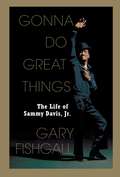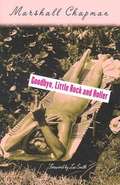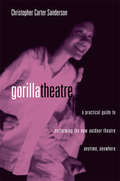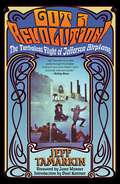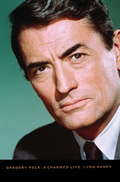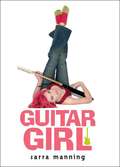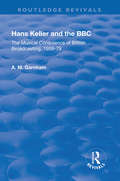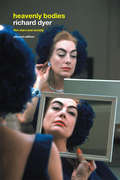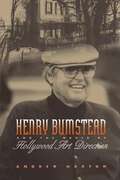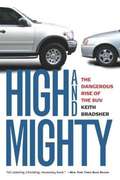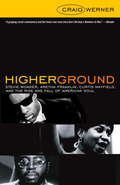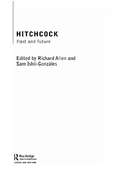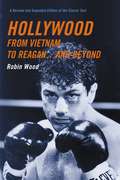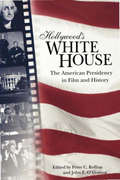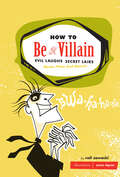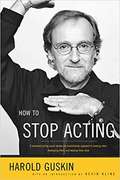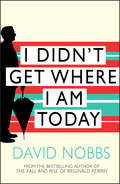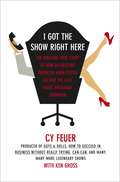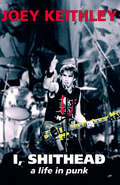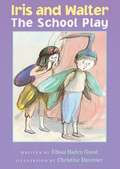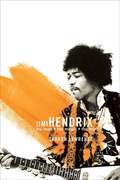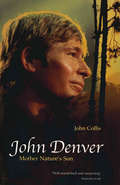- Table View
- List View
Gonna Do Great Things: The Life of Sammy Davis, Jr.
by Gary FishgallA major reappraisal of the life of legendary entertainer Sammy Davis, Jr., Gonna Do Great Things is at once an intimate portrait and an exuberant celebration of a wholly American icon. Through his multifaceted talent and personality, Sammy became one of the most magnetic and contentious figures in modern entertainment history. His outstanding talents as a dancer, singer, actor, impressionist, and comedian, combined with his close association with megastars and his interracial marriage, made him a celebrity in the truest sense.Born in Harlem in 1925, Sammy debuted onstage with Will Mastin's vaudeville troupe when he was only three years old. He was an instant hit, and his talent propelled him into one of the most luminous entertainment careers of his generation. No one could please a crowd like Sammy, whose overwhelming energy and infectious humor exhilarated audiences for sixty years. However, Sammy's life was not without hardship, and his high-spirited attitude often masked a fragile ego. From an impoverished, broken home, he lacked even a single day of formal education, and the rigors of his blossoming show business career denied him the traditional pleasures of childhood. Racism constantly affected his life, particularly when he joined the army in 1943. Because he refused to acknowledge any race-related restrictions, his very existence became a political statement. An active member of the Civil Rights movement and America's first African-American superstar, Sammy paved the way for other black entertainers. As a charter member of the Rat Pack, Sammy spent the 1950s and 1960s basking in an image of "cool" and endearing himself to the public. But by the 1970s he was relying on cocaine and alcohol, flirting with Satanism, indulging in scandalous sexual behavior, and becoming the punchline of jokes on Saturday Night Live. Though his fans still adored him, his performances suffered. A four-pack-a-day smoker, Sammy succumbed to cancer when he was sixty-four, shortly after celebrating six decades in the spotlight.Renowned biographer of Hollywood giants Jimmy Stewart, Burt Lancaster, and Gregory Peck, Gary Fishgall brings an actor's and director's understanding of the entertainment industry to Sammy's complicated existence. Meticulously researched and filled with insights gathered from interviews with those who knew Sammy best, Gonna Do Great Things reveals the fascinating and controversial life of this beloved entertainer.
Good Morning, Mr. Zip Zip Zip: Movies, Memory, and World War II
by Richard SchickelIn this memoir, film critic Schickel recalls his childhood days growing up in a Milwaukee suburb during World War II. The story centers around the author's lifelong love of the movies. Schickel also discusses the ways in which the wartime movies he enjoyed as a youth misled the public about the nature of the war, our soldiers, our government, and the home front. Annotation ©2004 Book News, Inc., Portland, OR (booknews.com)
Goodbye, Little Rock And Roller
by Marshall ChapmanGoodbye, Little Rock and Roller is an inventive and original book from Nashville singer/songwriter Chapman, who uses twelve of her most resonant songs as entry points to many of her life's adventures. Not a memoir, but a map of the places Chapman's been and what went through her mind as she was traveling there, this book is funny and tender, warm and exuberant. Raised a debutante in Spartanburg, South Carolina, the daughter of a mill owner and firmly part of proper society, Chapman became a rocker at a time when women weren't yet picking up electric guitars. She is "a living example," as one reviewer wrote, "of the triumph of rock and roll over good breeding." From New Year's Eve in 1978 when Jerry Lee Lewis gave Chapman advice on how to live life ("I mean it's one thing when your mother says 'Honey don't you think you'd better slow down?' But when The Killer voices his concern....") to the time her black maid Cora Jeter took the seven-year-old to see Elvis, Goodbye, Little Rock and Roller goes to the moments when the influences on Chapman's songwriting and psyche were cemented. And it winningly reveals how the creative process comes from life: one of Chapman's favorite songs was written after waking up facedown in her underpants in her front-yard vegetable garden. Revealing intimate rock and roll moments and memories of a South Carolina childhood, Marshall Chapman is a fresh voice firmly in the Southern tradition.
Gorilla Theater: A Practical Guide to Performing the New Outdoor Theater Anytime, Anywhere
by Christopher Carter SandersonFirst Published in 2003. Routledge is an imprint of Taylor & Francis, an informa company.
Got a Revolution!: The Turbulent Flight of Jefferson Airplane
by Jeff TamarkinThe most successful and influential rock band to emerge from San Francisco during the 1960s, Jefferson Airplane created the sound of a generation. Their smash hits "Somebody to Love" and "White Rabbit" virtually invented the era's signature pulsating psychedelic music and, during one of the most tumultuous times in American history, came to personify the decade's radical counterculture. In this groundbreaking biography of the band, veteran music writer and historian Jeff Tamarkin produces a portrait of the band like none that has come before it. Having worked closely with Jefferson Airplane for more than a decade, Tamarkin had unprecedented access to the band members, their families, friends, lovers, crew members, fellow musicians, cultural luminaries, even the highest-ranking politicians of the time. More than just a definitive history, Got a Revolution! is a rock legend unto itself. Jann Wenner, editor-in-chief and publisher of Rolling Stone, wrote, "The classic [Jefferson] Airplane lineup were both architects and messengers of a psychedelic age, a liberation of mind and body that profoundly changed American art, politics, and spirituality. It was a renaissance that could only have been born in San Francisco, and the Airplane, more than any other band in town, spread the good news nationwide."
Gregory Peck: A Charmed Life
by Lynn HaneyHis first screen test was a disaster, his features were large and irregular, his left ear outsized the right, yet he would one day be headlined as the Most Handsome Man in the World. And most of his leading ladies-among them, Ingrid Bergman, Jennifer Jones, Audrey Hepburn, Sophia Loren, and Ava Gardner-would not disagree. Irreverent, candid, refreshingly honest, Lynn Haney's carefully researched biography not only charts the remarkable career of the Oscar-winning star but also plumbs Peck's frequently troubling complexity in his off-screen roles as husband, father, lover, and son. About the tough times, Haney minces no words; but the misfortunes by no means eclipse the energy, intensity, and excitement that characterized Peck's five decades of moviemaking. This is a book filled with telling photographs, and a story cast with movie moguls from Louis B. Mayer to Darryl Zanuck, with directors from Hitchcock and Walsh to Huston and Wyler, with nearly every major luminary in Hollywood, and, starring for the first time in toto, Gregory Peck.
Guitar Girl
by Sarra ManningSeventeen-year-old Molly Montgomery never planned on becoming famous. Molly's band, The Hormones, was just supposed to be about mucking around with her best mates, Jane and Tara, and having fun. But when the deliciously dangerous Dean and his friend T join the band, things start happening fast. Soon The Hormones are front-page news, and their debut album is rocketing up the charts. Molly is the force behind the band, but the hazards of fame, first love, screaming fans, and sleazy managers are forcing the newly crowned teen queen of grrl angst close to the edge. Fame never comes for free, and Molly's about to find out what it costs.
Hans Keller and the BBC: The Musical Conscience of British Broadcasting 1959-1979
by A. M. GarnhamOriginally published in 2003, Hans Keller and the BBC is a vivid portrait of the changing face of British broadcasting seen through the work of one of its most significant personalities. Starting with an examination of Keller’s early psychological interests, and the evolution of his method of ‘functional analysis’ of music (with which the BBC was intimately concerned), the book charts the huge contribution Keller made to British music during his BBC years. Also explored in detail are the successive crises of the Third Programme and its replacement by Radio 3, together with Keller’s leading role in opposing the decline of the BBC’s cultural idealism. Drawing on a wealth of primary sources, much of which has never been previously examined, this study paints a striking picture of Keller’s personality in combination with the BBC’s turbulent inner workings, showing the effect of one remarkable individual on the most powerful musical institution in 20th-century Britain.
Heavenly Bodies: Film Stars and Society (Bfi Cinema Ser.)
by Richard DyerRichard Dyer's classic study of movie stars and stardom has been updated, with a new introduction by the author discussing the rise of celebrity culture and developments in the study of stars since publication of the first edition in 1986. Dyer's illuminating study is based around case studies of three major stars: Marilyn Monroe, Paul Robeson and Judy Garland. He draws on a wide range of sources, including the films in which each star appeared, to illustrate how each star's persona was constructed, and goes on to examine each within the context of particular issues in fan culture and stardom. Students of film and cultural studies will find this an invaluable part of there course reading.
Henry Bumstead and the World of Hollywood Art Direction
by Andrew HortonFrom a hotel in Marrakech in The Man Who Knew Too Much, to small-town Alabama in To Kill a Mockingbird, to Mission Control in Space Cowboys, creating a fictional, yet wholly believable world in which to film a movie has been the passion and life's work of Henry Bumstead, one of Hollywood's most celebrated production designers. In a career that has spanned nearly seventy years, Bumstead has worked on more than one hundred movies and television films. His many honors include Academy Awards for Art Direction for To Kill a Mockingbird and The Sting, as well as nominations for Vertigo and The Unforgiven.
High and Mighty: The Dangerous Rise of the SUV
by Keith BradsherFrom the book: Sport utility vehicles have taken over America's roads - pushing fuel consumption up and traffic safety down. Keith Bradsher has long been at the forefront of critical SUV coverage and in HIGH AND MIGHTY he delivers a thorough, undeniable indictment of these vehicles as much worse than cars for their occupants, for other motorists, for pedestrians, and for the planet itself. This masterpiece of investigative j'ournalism shows how a flawed regulatory system, a desperate Detroit, and our national love for "bigger and better" have combined to create a highway arms race that puts us all at risk.
Higher Ground: Stevie Wonder, Aretha Franklin, Curtis Mayfield, and the Rise and Fall of American Soul
by Craig WernerIn Higher Ground, one of our most insightful music writers brilliantly reinterprets the lives of three pop geniuses and the soul revolution they launched. Soul music is one of America's greatest cultural achievements, and Stevie Wonder, Aretha Franklin, and Curtis Mayfield are three of its most inspired practitioners. In midcentury America it was soul music--particularly the dazzling stream of recordings made by these three stars--that helped bring the gospel vision of the black church into the mainstream, energizing the era's social movements and defining a new American gospel where the sacred and the secular met. What made this gospel all the more amazing was that its most influential articulators were the sons and daughters of sharecroppers, storefront preachers, and single parents in the projects, whose genius gave voice to a new vision of American possibility. Higher Groundseamlessly weaves the specific and intensely personal narratives of Stevie, Aretha, and Curtis's lives into the historical fabric of their times. The three shared many similarities: They were all children of the great migration and of the black church. But the gospel impulse manifested itself in different ways within the dramas of their individual lives and musical creations. In Stevie Wonder's case, it was a literally color-blind universal sense of spirituality that expressed itself in his life and music as an urge toward transcendence, particularly in the mid-seventies when albums like Innervisions and Songs in the Key of Life radically revised what a pop album could be. For Aretha Franklin, the traditional gospel vision of a beloved community anchored in the strength of women comforted her through a life littered with tragedy and found expression in propulsive pop songs like "Respect" as well as in her legendary gospel albums. For Curtis Mayfield, the gospel notion of conscious living inspired him to create songs that served the purposes of the Civil Rights movement and the radical Black Power movement alike, from the gritty street drama of Superfly to the transcendent call of "People Get Ready." Werner doesn't just provide a narrative of three fascinating lives; he ties them together with a provocative thesis about American history and culture that compels us to reconsider both the music and the times. And aside from the personalities and the history, he writes beautifully about music itself, the nuts and bolts of its creation and performance, in a way that brings a new awareness and understanding to the most familiar music, forcing readers to listen to songs they've heard a thousand times with fresh ears. In Higher Ground, Werner illuminates the lives of three unparalleled American artists, reminding us why their music mattered then and still resonates with us today.
Hitchcock: Past and Future
by Richard Allen Sam Ishii-GonzálesThis new collection of writings on Alfred Hitchcock considers Hitchcock both in his time and as a continuing influence on filmmakers, films and film theory. The contributions, who include leading scholars such as Slavoj Zizek, Laura Mulvey, Peter Wollen, and James Naremore, discuss canonical films such as Notorious and The Birds alongside lesser-known works including Juno and the Paycock and Frenzy. Articles are grouped into four thematic sections: 'Authorship and Aesthetics' examines Hitchcock as auteur and investigates central topics in Hitchcockian aesthetics. 'French Hitchcock' looks at Hitchcock's influence on filmmakers such as Chabrol, Truffaut and Rohmer, and how film critics such as Bazin and Deleuze have engaged with Hitchcock's work. 'Poetics and Politics of Identity' explores the representation of personal and political in Hitchcock's work. The final section, 'Death and Transfiguration' addresses the manner in which the spectacle and figuration of death haunts the narrative universe of Hitchcock's films, in particular his subversive masterpiece Psycho.
Hollywood from Vietnam to Reagan . . . and Beyond
by Robin WoodThis classic of film criticism, long considered invaluable for its eloquent study of a problematic period in film history, is now substantially updated and revised by the author to include chapters beyond the Reagan era and into the twenty-first century. For the new edition, Robin Wood has written a substantial new preface that explores the interesting double context within which the book can be read-that in which it was written and that in which we find ourselves today. Among the other additions to this new edition are a celebration of modern "screwball" comedies like My Best Friend's Wedding, and an analysis of '90s American and Canadian teen movies in the vein of American Pie, Can't Hardly Wait, and Rollercoaster. Also included are a chapter on Hollywood today that looks at David Fincher and Jim Jarmusch (among others) and an illuminating essay on Day of the Dead.
Hollywood from Vietnam to Reagan...and Beyond: A Revised and Expanded Edition of the Classic Text
by Robin WoodThis classic of film criticism, long considered invaluable for its eloquent study of a problematic period in film history, is now substantially updated and revised by the author to include chapters beyond the Reagan era. For the new edition, Wood has included a considerable new preface, a chapter celebrating My Best Friend's Wedding, a section on 90s American teen comedies such as American Pie and Can't Hardly Wait, a chapter on Hollywood today that looks at David Fincher and Jim Jarmusch (among others), and a helpful essay on Day of the Dead.
Hollywood's White House: The American Presidency in Film and History
by Peter C. Rollins and John E. O’ConnorFrom action flicks to biopics to SNL skits, how presidents are portrayed on screen: &“An interesting study of the real presidency and the reel presidency.&” —USA Today Magazine Winner of the Popular Culture Association&’s Ray and Pat Browne Book Award Whether serious or satirical, biographical or fictional, the ways that US presidents are depicted in popular culture reveal much about us as a nation. The contributors to Hollywood&’s White House examine the historical accuracy of presidential depictions, illuminate their influence, and uncover how they reflect the concerns of their times and the social and political visions of the filmmakers. With reflections on portrayals of Washington, Adams, Lincoln, FDR, Nixon, and more, this volume, which includes a comprehensive filmography and a bibliography, is ideal for both historians and film enthusiasts. &“An engaging collection.&” —Robert Brent Toplin, author of Reel History: In Defense of Hollywood
How to Be a Villain: Evil Laughs, Secret Lairs, Master Plans and More!!!
by Neil ZawackiJumpstart your evil enterprise with this deviously clever step-by-step guide to joining the forces of darkness.Villains may never win, but they sure have more fun. Who doesn’t want to hatch a master plan for world domination or set up an evil hideout? In How to Be a Villain, Neil Zawacki answers all the most urgent questions: Should I go with a black or red theme? Do I invest in an army of winged monkeys or ninja warriors? And should I learn to play the pipe organ or just get a weird cat? Whether readers choose to pursue a career as a Criminal Mastermind, Mad Scientist, Corporate Bastard, or just a Wanna-be Evil Genius, they are sure to find plenty of tips for getting started. Cheaper than attending the annual Bad Guy Conference and way more fun than being good, How to Be a Villain is guaranteed to elicit deep-throated evil laughs across the land.
How to Stop Acting: A Renowned Acting Coach Shares His Revolutionary Approach to Landing Roles, Developing Them and Keeping Them Alive
by Kevin Kline Harold GuskinHarold Guskin is an "acting doctor" whose clients include Kevin Kline, Glenn Close, James Gandolfini, Bridget Fonda, and dozens more. In How to Stop Acting, Guskin reveals the insights and techniques that have worked wonders for beginners as well as stars. Instead of yet another "method," Guskin offers a strategy based on a radically simple and refreshing idea: that the actor's work is not to "create a character" but rather to be continually, personally responsive to the text, wherever his impulse takes him, from first read-through to final performance. <p><p> From this credo derives an entirely new perspective on auditioning and the challenge of developing a role and keeping it fresh, even over hundreds of performances. Drawing on examples from his clients' work and his own, Guskin presents acting as a constantly evolving exploration rather than as a progression toward a fixed goal. He also offers sound and original advice on adapting to the particular demands of television and film, playing difficult emotional scenes, tackling the Shakespearean and other great roles, and more. His book will find an eager and appreciative audience among novices and established actors alike.
I Am What I Ate... And I'm Frightened!!! And Other Digressions from the Doctor of Comedy
by Bill CosbyA New York Times Bestseller. Bill Cosby wants food lovers to know that they are not alone. Here, Cosby reflects back on his own sixty-five years of dining at the banquet of life. From the #1 bestselling author, a book of original comedic essays for the adult market focusing on the theme of why Americans are hooked on such bad eating, drinking and other self-indulgent and self-destructive health-related behaviors, beginning in childhood and continuing through old age.
I Didn't Get Where I Am Today
by David NobbsAs a small boy David Nobbs survived the Second World War unscathed, until his bedroom ceiling fell on him when the last bomb to be dropped on Britain by the Germans landed near his home. It was the nearest he came to the war, but National Service would later make him one of Britain's most reluctant soldiers. It was an unforgettable and often unpleasant experience.As a struggling writer, David was catapulted into the thrilling world of satire at the BBC when he rang THAT WAS THE WEEK THAT WAS with a joke and got through to David Frost, who sent a taxi for the joke. He never looked back. His greatness as a modern comic writer was confirmed by the publication of THE FALL AND RISE OF REGINALD PERRIN, which he adapted into the immensely successful television series that has entered the fabric of British cultural life, through phrases, images and brilliant humour. A mesmerising, beautifully told tale of life in writing and comedy, I DIDN'T GET WHERE I AM TODAY is the hilarious, poignant and very personal story of David Nobbs' life, which also describes some of the most famous comedians of the last century and captures a golden age of British television.
I Got The Show Right Here
by Ken Gross Cy FeuerGuys & Dolls...The Boyfriend...How to Succeed in Business Without Really Trying...Can-Can... These are just a few of the many Broadway shows produced by the legendary Cy Feuer, who, in partnership with the late Ernest H. Martin, brought to life many of America's most enduring musicals. Cy Feuer was at the center of these creations, as well as the films based on two of Broadway's most exceptional musicals, Cabaret and A Chorus Line. He was the man in charge, the one responsible for putting everything together, and -- almost more important -- for holding it together. Now, at age ninety-two, as Cy Feuer looks back on the remarkable career he had on Broadway and in Hollywood, the stories he has to tell of the people he worked with are fabulously rich and entertaining. There's Bob Fosse, a perfectionist with whom Feuer did battle over the filming of the movie Cabaret. There's Frank Loesser, the brilliant and explosive composer of Guys & Dolls, Where's Charley?, and How to Succeed... There's Liza Minnelli, star of both the movie Cabaret and the Broadway musical The Act, whose offstage activities threatened to disrupt the show. There's the contentious George S. Kaufman, the librettist and director whose ego was almost as great as his talent. Add to the list such glamorous figures as Cole Porter, Julie Andrews, Abe Burrows, Gwen Verdon, John Steinbeck, Martin Scorsese, and George Balanchine, and you have a sense of the unbeatable cast of characters who populate this fabulous story of a young trumpet player from Brooklyn who became musical director for the Republic Pictures film studio, then feverishly tackled Broadway, back when "putting on a show" did not require the support of major corporations, and when dreams of overnight success really did have a chance of coming true. Funny, witty, and immensely entertaining, I Got the Show Right Here is a treat for anyone who loves show business, a story wonderfully told by one of Broadway's greatest and most talented producers.
I, Shithead
by Joey Keithley Jack RabidJoey Keithley, aka Joey Shithead, founded legendary punk pioneers D.O.A. in 1978. Punk kings who spread counterculture around the world, they've been cited as influences by the Red Hot Chili Peppers, Green Day, Rancid and The Offspring; have toured with The Clash, The Ramones, The Dead Kennedys, Black Flag, Nirvana, PiL, Minor Threat and others; and are the subject of two tribute albums. They are the band that introduced the term "hardcore" into punk lexicon and may have turned Nirvana's lead singer Kurt Cobain onto a career in music.But punk is more than a style of music: it's a political act, and D.O.A. have always had a social conscience, having performed in support of Greenpeace, women's rape/crisis centres, prisoner's rights, and antinuke and antiglobalization organizations. Twenty-five years later D.O.A. can claim sales of hundreds of thousands of copies of their 11 albums and tours in 30 different countries, and they are still going strong.I, Shithead is Joey's personal, no-bullshit recollections of a life in punk, starting with the burgeoning punk movement and traversing a generation disillusioned with the status quo, who believed they could change the world: stories of riots, drinking, travelling, playing and conquering all manner of obstacles through sheer determination.Praise for D.O.A.:"They rock out. They blow the roof off. Some of the best shows I've seen in my life were D.O.A. gigs. I've never seen D.O.A. not be amazing."--Henry Rollins (Black Flag, Rollins Band)"The proper medicine growing young minds needed."--Jello Biafra (Dead Kennedys)"Joey Shithead casts a long shadow."--John Doe (X)"They've changed a lot of people's lives."--Dave Grohl (Nirvana, Foo Fighters)Joey "Shithead" Keithley has long been an activist, including as a candidate for the Green Party, and is the founder of Sudden Death Records (www.suddendeath.com). He lives in Vancouver with his wife and their three children.
Iris and Walter: The School Play
by Elissa Haden Guest Christine DavenierIris and Walter can't wait for opening day of their first school play. Walter helps Iris make her costume. Iris helps Walter practice his lines. But when Iris wakes up sick on the morning of their debut, it looks like the curtain is going up on a big disappointment. . . .
Jimi Hendrix: The Man, The Music, The Truth
by Sharon LawrenceThe genius we never understood. . . . The man we never knew. . . . The truth we never heard. . . . The music we never forgot. . . . A revealing portrait of a legend by a close and trusted friend.
John Denver: Mother Nature's Son
by John CollisJohn Denver was America's biggest-selling solo star of the '70s. In commercial terms he was on a par with Sinatra in the '40s, Elvis in the '50s and the Beatles in the '60s. He experimented with a variety of styles and won fans from such diverse worlds as folk, pop and country music. Beneath the often tranquil surface of his music and his clear, clean tenor voice, however, lurked a darker side to Denver's character. The writer of 'Annie's Song', one of the most straightforward and personal expressions of love, became a wife-beater. The man who cavorted with the Muppets was an alcoholic. The committed environmentalist had his own plane, the most polluting form of transport. John Collis has delved deep to discover exactly who John Denver was. By unravelling the complexities of the singer's personality and background, he reveals Denver as a complicated, contradictory man, much more intriguing than the sometimes placid surface of his music might suggest. Millions of people around the globe found something in his music that touched their souls; Collis, by charting Denver's career and development as an artist, explores his legendary contribution not only to the world of music but also to the society of which he was a protagonist and a victim.
